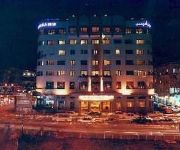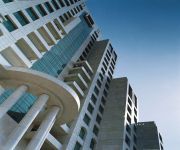Safety Score: 5,0 of 5.0 based on data from 9 authorites. Meaning it is not safe to travel Syria.
Travel warnings are updated daily. Source: Travel Warning Syria. Last Update: 2024-08-13 08:21:03
Delve into Shāghūr Juwwānī
The district Shāghūr Juwwānī of Damascus in Damascus Governorate is a subburb in Syria and is a district of the nations capital.
If you need a hotel, we compiled a list of available hotels close to the map centre further down the page.
While being here, you might want to pay a visit to some of the following locations: Babila, Jaramana, Al Hajar al Aswad, Kafr Batna and `Irbin. To further explore this place, just scroll down and browse the available info.
Local weather forecast
Todays Local Weather Conditions & Forecast: 14°C / 58 °F
| Morning Temperature | 8°C / 46 °F |
| Evening Temperature | 14°C / 57 °F |
| Night Temperature | 10°C / 50 °F |
| Chance of rainfall | 0% |
| Air Humidity | 34% |
| Air Pressure | 1017 hPa |
| Wind Speed | Light breeze with 4 km/h (2 mph) from South-West |
| Cloud Conditions | Clear sky, covering 0% of sky |
| General Conditions | Sky is clear |
Wednesday, 4th of December 2024
13°C (56 °F)
11°C (52 °F)
Sky is clear, light breeze, clear sky.
Thursday, 5th of December 2024
14°C (57 °F)
11°C (52 °F)
Overcast clouds, light breeze.
Friday, 6th of December 2024
15°C (59 °F)
12°C (54 °F)
Scattered clouds, gentle breeze.
Hotels and Places to Stay
SEMIRAMIS
FOUR SEASONS DAMASCUS
QUEEN CENTRE ARJAAN BY ROTANA
Videos from this area
These are videos related to the place based on their proximity to this place.
أغنية نادي الوحدة الدمشقي (جوا الشام) Alwahdeh Club , Damascus Syria
تأسس سنة : 1928 كل نادي الوحدة الملقب ( بالبرتقالة الدمشقية ) ركيزة أساسية من ركائز رياضة العاصمة خاصة والرياضة...
مدينة الألعاب مدينة الملاهي Amusement park Rollercoaster City Games
صور ملتقطة من مدينة الملاهي في دمشق منطقة المزة مواقعنا على النت الموقع الأول في العالم http://www.aboaumir.blogspot.com...
هنا دمشق...Here is Damascus,Syria (أصالة نصري-هذي دمشق)
هنا دمشق من كل أنحاء العالم ...نصرخ ونقول ان كل أصقاع الأرض تنده وتصرخ وتقول دمشق هنا الحرية وهنا الروح وهنا...
KEMAREAH Hotel Damascus فندق القيمرية دمشق www.kemareah.com
http://www.kemareah.com KEMAREAH Hotel , دمشق القديمة Damascus - old city Kemareah Hotel is located in the heart of Old Damascus city, five minutes by feet fromOmmayades Mosque,...
Videos provided by Youtube are under the copyright of their owners.
Attractions and noteworthy things
Distances are based on the centre of the city/town and sightseeing location. This list contains brief abstracts about monuments, holiday activities, national parcs, museums, organisations and more from the area as well as interesting facts about the region itself. Where available, you'll find the corresponding homepage. Otherwise the related wikipedia article.
Barada
The Barada is the main river of Damascus, the capital city of Syria. It flows through the spring of ‘Ayn Fījah (عين فيجة), about 27 km north west of Damascus in the Anti-Lebanon Mountains, but its source is Lake Barada, located at about 8 km from Zabadani. The Barada descends through a steep, narrow gorge named "Rabwe" before it arrives at Damascus, where it divides into seven branches that irrigate the oasis of Ghouta (الغوطة). The 'Barada' name is thought to derive from 'barid', i.e. 'cold'.
Al-Zahiriyah Library
The Az-Zahiriyah library in Damascus, Syria dates back to 1277, taking its name from its founder Sultan Baibars (1223–1277). Building this library was his father’s idea but he died before he could achieve it. Initially Az-Zahiriah was a public school in charge of teaching Quranic sciences. The decorations, carvings, and writing on the building walls, in addition to the gate which bears geometric designs and patterns, make the library one of the most important buildings in Damascus.
Bab al-Saghir
Bāb Saghīr, also called "Goristan-e-Ghariban", is an ancient cemetery and street in Damascus, Syria, with tombs on either side of the road. It is located in the Dimashq neighborhood, southwest of Umayyad Mosque.
Al-Hamidiyah Souq
Al-Hamidiyah Souq is the largest and the central souk in Syria, located inside the old walled city of Damascus next to the Citadel. The souq starts at Al-Thawra street and ends at the Umayyad Mosque plaza. It was one of the treasures featured in Around the World in 80 Treasures presented by Dan Cruickshank.
Azm Palace
Azm Palace is a palace in Damascus, Syria which was originally built in 1750 as a residence for the Ottoman governor of Damascus As'ad Pasha al-Azm. The palace now houses the Museum of Arts and Popular Traditions.
Al-Adiliyah Madrasa
Al-Adiliyah Madrasa is a madrasah located in Damascus, Syria. Founded in 1215 by Sultan Al-Adil I. He was buried in the school. And his son Al-Mu'azzam finished building the school. The madrasa is considered an important example of Ayyubid architecture in Syria.
Bab al-Faraj (Damascus)
Bab al-Faraj also known as Bab al-Bawabijiyah and Bab al-Manakhiliyah is one of the gates of the old city of Damascus in Syria. The gate was built as part of a large program to re-fortify the city following its capture by Nur ad-Din Zangi in 1154. The twin gate crosses a bridge over a section of the Barada river that runs along the northern city walls of Damascus. The gate is notable for being the only surviving gate in the city that was built completely after the Muslim conquest of Damascus.
Bab al-Jabiyah
Bab al-Jabiya or the Gate of Jupiter is one of the eight ancient city-gates of Damascus, Syria. Bab al-Jabiya was the main entrance on the city's west side. The gate opens on Medhat Pasha Souq, which is the modern western half of the Street Called Straight, the Roman east-west artery, which still connects it to Bab Sharqi (the Roman "Gate of the Sun").
Sayyidah Ruqayya Mosque
Sayyidah Ruqayya Mosque is a shrine located in Damascus, Syria, that contains the grave of Sukayna (née Ruqayyah), the infant daughter of Husayn ibn ‘Alī. After enduring the advent of Karbalā and the torturous journey to Damascus that followed it, Sukayna died at the age of four in Yazid's prison, where she was originally buried. Years later however, upon the flooding of her gravesite, her grave was reopened and she was moved to the site where the Mosque now stands.
Bayt al-Aqqad
Bayt al-Aqqad (Aqqad House) is an old Damascene house that hosts the Danish Institute in Damascus, Syria. The history of the building is more than 2000 years: Remains of the theatre of Herod the Great were found in the outer walls and now forms a part of the wall in the secretary’s office. Other parts of the house include the northern and southern buildings which were built in the late 15th century in a late Mamluk style and decoration.
Maktab Anbar
Maktab Anbar (Anbar Office) is an old house in the center of Old Damascus near the Umayyad Mosque and a short distance from the Street Called Straight. The house was built as a private residence by a local Jewish notable Mr. Anbar in the mid 19th century. The house is built around three courtyards, first the formal reception courtyard, behind this the attractive female courtyard, and finally the spartan servants' courtyard.
Sinan Pasha Mosque (Damascus)
The Sinan Pasha Mosque is an early Ottoman-era mosque in Damascus, Syria, located along Suq Sinaniyya Street.
Khan As'ad Pasha
Khan As'ad Pasha is the largest khan in the Old City of Damascus, covering an area of 2,500 square metres . Situated along Al-Buzuriyah Souq, it was built and named after As'ad Pasha al-Azm, the governor of Damascus, in 1751-52. Khan As'ad Pasha has been described as one of the finest khans of Damascus, and the most "ambitious" work of architecture in the city. Throughout the Ottoman era, it hosted caravans coming from Baghdad, Mosul, Aleppo, Beirut and elsewhere in the Middle East.
Khan Sulayman Pasha
Khan Sulayman Pasha is a large khan in the Old City of Damascus. Located in the walled city of Damascus on the eastern side of the Street Called Straight, facing Suq al-Khayyatin and Al-Buzuriyah Souq. It was built and named after Sulayman Pasha al-Azm, the governor of Damascus, in 1732-36. The khan is popularly known as Khan al-Hamasina because traders from Homs used to rent its shops and warehouses.
Al-Buzuriyah Souq
Al-Buzuriyah Souq is a historical souk located to the south of the Umayyad Mosque inside the old walled city of Damascus, Syria. The souk is famous for its spices vendors, and the many historical khans located along it, including Khan As'ad Pasha. On its southern end it meets Medhat Pasha Souq.
Medhat Pasha Souq
Medhat Pasha Souq (also called Al-Taweel Souq) is a historical souk which forms the western half of the Street Called Straight inside the old walled city of Damascus, Syria. It was named after the Ottoman governor of Syria Midhat Pasha who renovated it and ordered its coverage with a lead-shade. Many smaller souqs branch out of Medhat Pasha including al-Buzuriyah Souq and al-Harir Souq. Many important sites are located along the street including Maktab Anbar.
Statue of Saladin
The Statue of Saladin is an oversize equestrian bronze statue depicting the Kurdish Ayyubid Sultan Saladin located in front of the Citadel of Damascus in Damascus, Syria. The statue, designed by Syrian sculptor Abdallah al-Sayed and erected at municipal expense, was unveiled by the late Syrian president Hafez Assad in 1993 to mark the 800th anniversary of Saladin's death.
Bakdash (ice cream parlor)
For the founder of the Syrian Communist Party, see Khalid Bakdash. Bakdash also Bakdach is an ice cream parlor in Damascus, Syria. The shop was established around 1885 in Al-Hamidiyah Souq in the old city of Damascus. It is famous for its pistachio-covered Booza, a pounded ice cream with an elastic texture made of mastic and sahlab. It is famous around the Arab World and has become a popular tourist attraction.
Khan al-Harir
Khan al-Harir is a large khan in the Old City of Damascus covering an area of 2,500 square metres . It was built on the orders of Darwish Pasha, the governor of Damascus, in 1573-74. Darwish Pasha founded it as a waqf for the benefit of the Darwish Pasha Mosque. The Khan was the first great caravanserai inside the old city walls of Damascus. Its construction marks the beginning of a shift in mercantile and trade activity to the area southwest of the Umayyad Mosque.
Al-Hariqa
Al-Hariqa is a neighborhood in Damascus, Syria. It lies inside the walls of the old city south of the Citadel of Damascus between the late-Ottoman-era markets of al-Hamidiyah Souq and Medhat Pasha Souq. The neighborhood was known as Sidi Amoud after a famous holy man who was buried there. It was called al-Hariqa (Conflagration) after the area was completely burned down in 1925 under French bombing in response to the Great Syrian Revolt. It is a commercial hub famous for its clothing markets.
Al-Shaghour
Al-Shaghour is a neighborhood located in the old walled city of Damascus, Syria. Al-Shaghour is one of the oldest recorded neighborhoods in the city. Parts of the neighborhood made up the Jewish quarter, as it had the largest Jewish community in the city. The neighborhood is also home for many of the prominent Shiite families in Damascus. Al-Ameen street, named after a prominent Shiite figure, is the main road in the neighborhood and accommodates the market place and the main shops.
Nur al-Din Bimaristan
Nur al-Din Bimaristan is a large medieval bimaristan ("hospital") in Damascus, Syria. It is located in the al-Hariqa quarter in the old walled city, to the southwest of the Umayyad Mosque. It was built and named after the Zengid Sultan Nur ad-Din in 1154. The bimaristan is well known for its unusual portal, which displays an antique lintel and a curious flattened muqarnas vault. It is also unusual in its full-scale Mesopotamian-style muqarnas vault over the vestibule.
Qubbat al-Khazna
Qubbat al-Khazna, meaning the "Dome of the Treasury", is an old structure, located inside the courtyard of the Umayyad Mosque in Damascus, Syria. It is an octagonal structure decorated with mosaics, standing on eight Roman columns. The Dome of the Treasury, like the mosque's prayer hall facade, was once completely covered in the colorful mosaic decoration for which the mosque was famous. The dome was built under orders from the governor of Damascus, Fadl ibn Salih, in 789.
Mausoleum of Saladin
The Mausoleum of Saladin holds the resting place and grave of the medieval Kurdish Ayyubid Sultan Saladin. It is located next to the northwest corner of the Umayyad Mosque in Damascus, Syria. The mausoleum was built in 1196, three years after the death of Saladin. It was once part of the al-Aziziyah madrasah, but nothing remains of the school.
Temple of Jupiter, Damascus
The Temple of Jupiter in Damascus was built by the Romans, beginning during the rule of Augustus and completed during the rule of Constantius II. An ancient Aramaean temple to Hadad once stood on this site. The Romans associated Hadad with Jupiter, and rebuilt the temple in Jupiter's name. The temple drew large crowds to its festivals and Damascus became famous as the city of Jupiter. Theodosius I converted the temple to a church dedicated to John the Baptist.
















